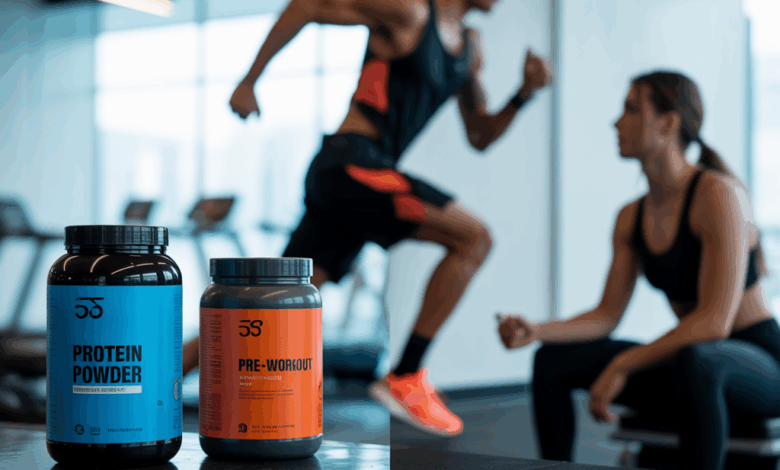What Is the Difference Between Protein Powder and Pre Workout?

Ever stood in the supplement aisle wondering whether to grab a tub of whey or a flashy pre-workout canister? Maybe you’ve thought, “Do I need both?” or “Which one actually helps me reach my goals?” If you’ve asked yourself what is the difference between protein powder and pre workout, you’re not alone — and this guide will clear it up in practical, no‑nonsense terms.
Quick takeaway: The short, practical answer
Protein powder is a recovery and building tool—focused on delivering amino acids and supporting muscle repair and growth. Pre-workout is an energy and focus tool—designed to boost performance, increase alertness, and delay fatigue during your training session. They can be used together, but they serve very different purposes.
What is the difference between protein powder and pre workout: the detailed breakdown
What protein powder does (and why it matters)
Protein powders (whey, casein, plant blends) supply concentrated protein and essential amino acids like leucine, which trigger muscle protein synthesis. They are best known for:
- Supporting muscle repair and growth after resistance training.
- Helping you meet daily protein targets when whole food isn’t available.
- Providing convenient, low-fat options for weight management or bulking plans.
Typical use: taken immediately after workouts or as a protein-rich snack to hit daily macros.
What pre-workout does (and when to use it)
Pre-workout supplements are formulated to enhance workout performance. Common ingredients include caffeine, beta-alanine, citrulline, and creatine. Their benefits include:
- Increased energy and mental focus (thanks to caffeine and stimulants).
- Improved endurance and reduced perception of effort (beta-alanine).
- Enhanced blood flow and muscle pump (citrulline).
Typical use: taken 20–45 minutes before training to maximize intensity, volume, or speed during the session.
Key ingredient comparison: what’s inside each and why it matters
Understanding ingredients helps you match a product to your goals.
- Protein powders: whey, casein, soy, pea — rich in BCAAs, especially leucine. Often single ingredient, calories and macros matter.
- Pre-workouts: caffeine, citrulline malate, beta-alanine, taurine, B-vitamins, sometimes creatine. Designed for acute performance effects rather than nutrition.
- Overlap: some pre-workouts include BCAAs or creatine; some protein powders add caffeine (less common). Read labels carefully.
When to choose protein powder vs pre-workout
Match the supplement to your immediate goal and training context:
- Goal: build muscle — prioritize hitting protein targets with protein powder daily; use pre-workout on heavy training days if you need an energy boost.
- Goal: lose fat but keep strength — use protein powder to preserve lean mass; watch pre-workout stimulant timing (avoid late-day caffeine).
- Goal: endurance or HIIT — pre-workout ingredients like caffeine and beta-alanine can boost performance; protein afterward aids recovery.
Real-world example
Emily trains fasted in the morning for 45 minutes of strength work. She takes a small caffeine-based pre-workout 30 minutes before lifting to increase focus, then has a whey protein shake within 30 minutes post-workout to support recovery. Both products serve complementary roles.
Practical fitness tips and workout variations
Use these actionable strategies to make supplements work for you, not the other way around.
- Always prioritize nutrition: supplements complement, don’t replace, balanced meals. If you struggle to eat enough protein, a shake is a convenient tool.
- Experiment with timing: if pre-workout causes jitters, try half a dose or switch to a stimulant-free formula.
- Sample workout combos:
- Strength day (hypertrophy): 4 sets of 8–12 reps compound lifts. Pre-workout for focus, protein shake post-workout.
- HIIT session: short intense intervals (30s on / 90s off) x10. Stimulant pre-workout can increase power; protein within 1 hour to repair.
- Endurance run: steady-state 45–60 minutes. Pre-workout rarely necessary unless you need a caffeine boost; focus on carbs/hydration instead.
- Stacking tip: if you use creatine, consistency is more important than timing — it can be taken with your protein shake.
- Hydration and sleep: both amplify results. A good night’s sleep and 2–3 liters of water/day improve energy and recovery far more than most supplements.
Safety, cost, and label reading
Be mindful of stimulant tolerance, ingredient transparency, and budget. Tips:
- Check caffeine content on pre-workout labels and avoid doubling up with strong coffee.
- Choose third-party tested protein powders to avoid contaminants; prioritize minimal additives if you have dietary sensitivities.
- Cost-effectiveness: protein powders often deliver more tangible, long-term benefits per dollar if your goal is muscle gain or fat loss.
Healthy lifestyle advice to amplify results
Supplements are tools. Combine them with these fundamentals:
- Progressive overload in your training to stimulate growth.
- Balanced meals with whole-food proteins, vegetables, healthy fats, and complex carbs.
- Consistent sleep (7–9 hours), stress management, and daily movement.
Frequently Asked Questions
Yes. Many athletes use pre-workout before training for energy and protein after training for recovery. Just watch total caffeine intake and follow recommended dosages.
Protein powder is more directly effective for muscle gain because it supplies the amino acids necessary for repair and growth. Pre-workout can help you train harder, which indirectly supports gains, but it’s not a substitute for adequate protein.
Take pre-workout 20–45 minutes before your session for best effects. Take protein powder within 30–90 minutes after training, or anytime during the day to meet your protein needs.
Conclusion — choose the right tool for the job
So, what is the difference between protein powder and pre workout? In short: protein powder fuels recovery and muscle building, while pre-workout fuels performance and focus. Both can be part of a smart program, depending on your goals, timing, and tolerance. Start by prioritizing whole foods and daily protein targets, then layer in a pre-workout on days you need an extra push.
Ready to optimize your plan? Try tracking your protein intake for a week, experiment with a low-dose pre-workout on a heavy training day, and adjust based on how you feel. For more structured plans and guidance, explore our workout routines, check out practical tips in our nutrition guides, and balance recovery with smart habits from our wellness tips page. Want help choosing the right products for your goals? Leave a comment or sign up for a personalized plan today.





